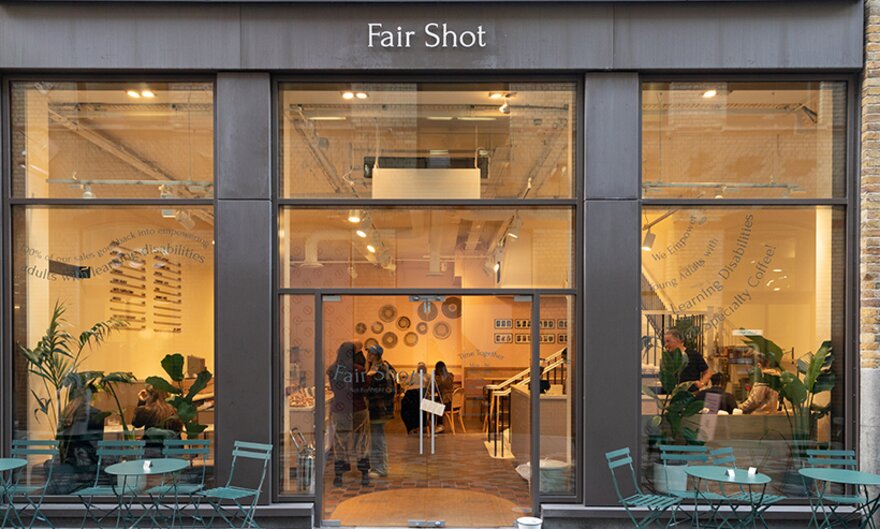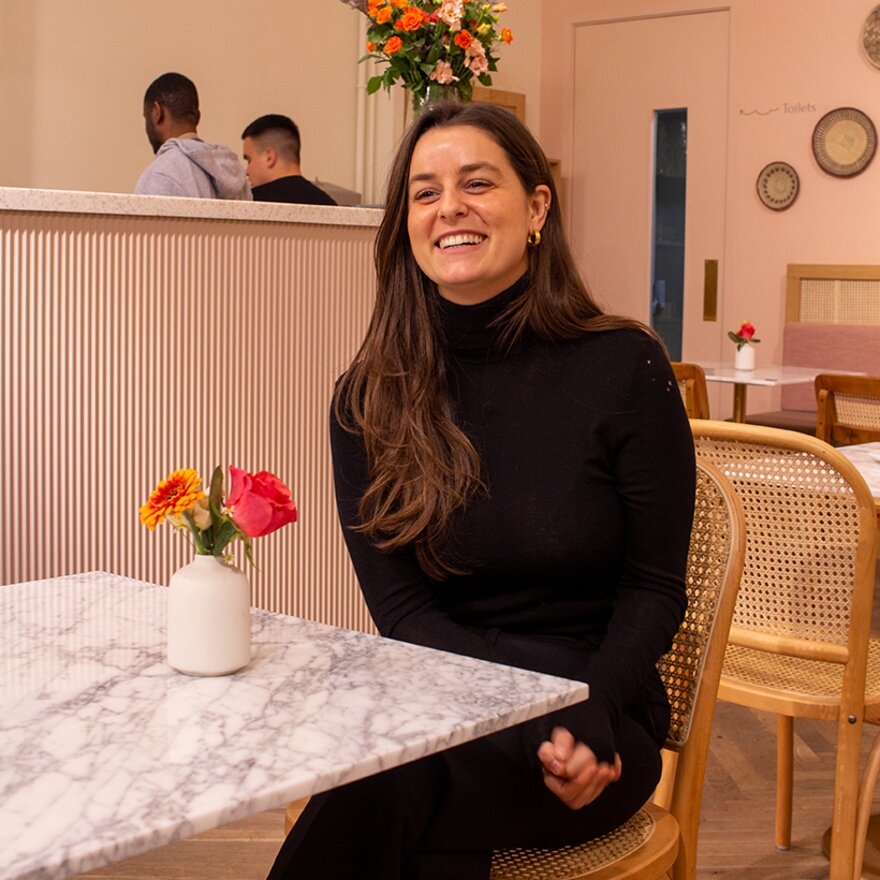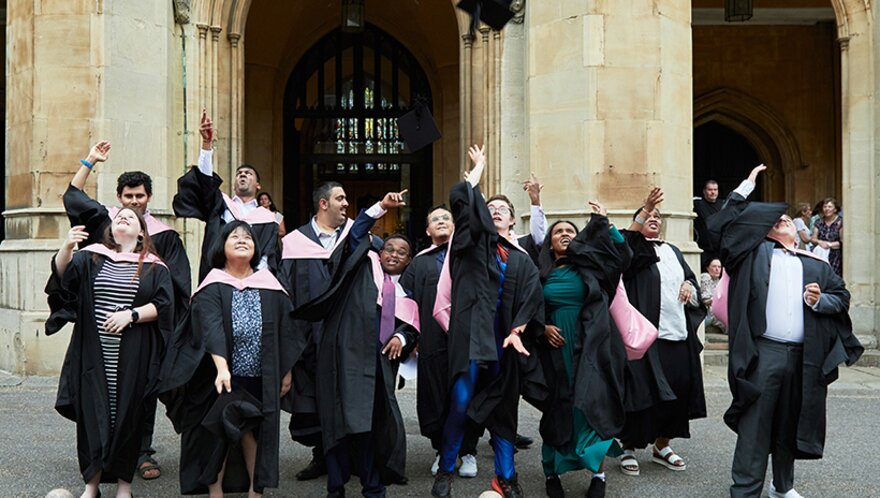Fair Shot café is changing lives by removing barriers. Jungmin Seo sees how founder Bianca Tavella made her dream a reality creating a workplace for those with learning disabilities
Fair Shot café in the Yards of London's Covent Garden has much in common with the array of stylish, independent cafés dotted across the capital. Complete with millennial pink walls, fluted cream tiles and rattan chairs, this mid-century boho haunt offers turmeric lattes and vegan peanut butter cupcakes.
But those who pay more attention might notice that the space behind the counter is unusually wide, that staff move in pairs, and that baristas practise pouring espresso shots in a separate booth, away from the main cashier. This isn't just a trendy London opening; it's a two-year-old social enterprise that seeks to overturn the 94% unemployment rate confronting people with learning disabilities. According to figures from Mencap, approximately 1.5 million people in the UK are impacted by barriers to learning, meaning 1.4 million people may struggle to ever find work.
Bianca Tavella officially founded Fair Shot in 2019. It had been a dream of hers since she was 14, having grown up surrounded by people with learning disabilities. She wanted to create a professional space that respected their needs simply because "it just made sense: there's so many different types of jobs that are very malleable to the individual".
Tavella studied politics at university and worked for non-governmental organisations before taking on a role at garden centre restaurant Petersham Nurseries, where she helped to project manage four openings under the brand, including its site in Covent Garden. After that, she spent a year accruing further front-line hospitality experience at Rude Health café, focusing on coffee-making, simultaneously perfecting her business plan for Fair Shot.
When she started pitching the initiative to investors Tavella was 23, but she happily confesses she "looked 16".
"There was a lot that was difficult: you are a woman, you look really young and you're pitching for a charity, so there's this kind of cute perspective people do," she explains. "People only buy into the idea if they respect the entrepreneur and you have to help them buy into yourself."
In the face of these challenges in the past year alone, Tavella has successfully fundraised two central London locations, with each costing roughly £350,000 for the fit-out, equipment, staff, electricity and marketing. The first site opened in Mayfair in December 2021, but its lease was cut short to 10 months due to renovations on South Molton Street. So, she did it all over again to launch the Covent Garden café in February this year, which is twice the size of the original venue.
Despite the recent surge in crowdfunding initiatives in the industry, which have seen the involvement of big players such as Bib Gourmand-holder Bancone in Covent Garden, Tavella reasoned this wouldn't be an option for Fair Shot because of the underlying expectation that people "give something and get something back". She felt she didn't have enough to offer customers on a material level, other than multiple cups of coffee. That said, the team were still able to raise £50,000 via their JustGiving page off the back of broadcast coverage from the BBC in October 2021.
Sweet charity
As a business model, Fair Shot is part start-up, part charity and part café, and this structure has made it challenging for the group to find adequate funding. Tavella had to raise £100,000 herself, which acted as cashflow during the first year. Although the café is not "far off breaking even" each month, the cashflow is there to act as a buffer in the case of losses. "That's basically the only way that we've been able to survive," she says.
"Being a charity makes everything much more difficult, but it's also kind of a blessing in disguise, because it does give you that tiny bit of being able to fundraise and getting 80% off on business rates. There's no other way that we would be where we are."
In March's Spring Budget, chancellor Jeremy Hunt made a commitment to the Health and Disability White Paper, which sets out "ambitious reforms to help more disabled people to start, stay and succeed in work", including the expansion of Work Coach support. However, Tavella says there is still a long way to go. Fair Shot receives help from job coaches during busy lunchtimes, who are paid via the government-funded programme Access to Work, but the charity-business is only eligible for the scheme because of the nature of the selected trainees, who are all aged between 18 to 25 and with a healthcare plan.
She is frustrated by the limited government support: "If they did [provide more support], there could be so many Fair Shots. No one's just going to sacrifice five years of their life like I did to get this done," she adds. "It's a miracle we're here." That said, if there were such a thing as a silver lining to the cost-of-living crisis, it would be the fact that customers are especially attuned to where they are spending their money. "We stand out a lot more now. People are thinking about where their money might actually keep making an impact," Tavella explains.
Path to employment
So how exactly does Fair Shot change people's lives? Twelve trainees, all of whom have learning disabilities, are selected after an interview process for the start of the grad-scheme in September. The course runs for 11 months and sees those selected spend four days a week in the café, working five-hour shifts learning about "every single aspect ofeverything", including coffee, front of house and food. Tavella is confident that the trainees fully immerse themselves in the experience and "come out of it as experts".
In addition, Fair Shot has established a post-trainee ‘feeder' scheme, also known as the Employment Programme. It has been designed to ensure each graduate has an entry-level path into sustainable paid employment upon completion of the traineeship. Tavella and the team are involved in curating a job for each trainee six months prior to their departure from Fair Shot.
Graduates predominantly continue to work in the hospitality industry, taking on roles such as coffee baristas, commis chefs or hotel hosts. She says the sector lends itself to entry-level training programmes as it is well-adapted to high turnover, meaning hospitality can be an accessible source of work for people, especially those with disabilities.
There are currently eight employment partners, which include Gentleman Baristas, Treehouse Hotels, Chestnut bakery and Scandinavian restaurant Aquavit. The portfolio continues to grow, with more businesses approaching Fair Shot for guidance. Collaborating businesses receive disability awareness training, wellbeing and mental health workshops, as well as access to job coaches from Fair Shot. "We go in to visit the venues and we make sure that it's actually going to work. We keep supporting them for six months afterwards," says Tavella.
There's always a slight worry among employers about ‘getting disability wrong', but she assures partnering businesses that it is part of Fair Shot's mission to create a "safe space" for asking potentially thorny questions. The partnership, which is led by Valen Calanche, head of employment and diversity, equity and inclusion consultant at Fair Shot, gives employers an opportunity to understand "what's appropriate and what's not".
"I think that's only possible when you open up the conversation," Tavella explains. "If everyone's constantly scared of saying the wrong thing, how are we meant to get anywhere?"
She adds that the collaborative experience, which stems from building a close relationship with the employers, has been overwhelmingly positive: "It's not based on them getting anything back financially; they are genuinely doing something for their team, for someone else."
The disability dimension
For Tavella, disability is something that warrants greater attention in its own right and something that needs to be acknowledged with nuance. "It's completely amazing that people are focusing on discrimination and the gender pay gap, but I think there's definitely a huge other dimension to this, which is disability," she says.
She believes that the "obscene" 94% unemployment rate for people with learning disabilities arose from generations of employers believing they can't integrate professionally, that "they're not going to be able to do the job as well as a person who is atypical. It can be true in some cases, but it's not true in every case".
Lack of perception has naturally led to a lack of opportunities for people with learning disabilities. Without access to work experience, "there's literally no way for them to even test themselves or for their family to know what their true potential is". After a pause, she adds: "That's why we call it Fair Shot, because we're finally the ones that are giving them the fair shot."
Erasing assumptions and building awareness happens seamlessly between colleagues at Fair Shot café. Joe Walker, assistant café manager, has never professionally worked with people with learning disabilities until now. He says he was nervous before his first shift, but that he became more relaxed after talking to a trainee. "I was on the coffee machine with Abdul, and he introduced himself and was very upfront. He was like: ‘It's OK, you're with me now'," he recalls. "I immediately felt at ease."
While on shift, he has noticed a few instances where customers veer into ‘patronising' territory, speaking to some of the trainees as though they are children. "We don't need to be like that. You come in, order a coffee and just sit down. It doesn't matter," he explains. He recollects an episode with another trainee, Geoffrey, who was spoken to in a condescending manner by a customer: "He kind of turned to me and was like: ‘was she alright?'." Walker didn't intervene in that situation, but points out that Fair Shot provides an opportunity for customers to reconsider their attitudes towards disability.
He hopes that employers understand what he deems to be a fundamental truth – that disabilities are just about acknowledging differences. "Everyone in the world has different strengths and weaknesses. That's all you need to understand," he says. Fair Shot's graduates continue to maintain a 100% employment rate since the programme officially launched in December 2021. The team will be increasing its third cohort by 25% from 12 to 15 trainees come September.
Tavella intends to fundraise for more Fair Shots, though she admits that expansion won't be happening very soon. "Opening two cafés in one year has just made me feel like a shell of a human being [but] we're looking to open one in the City in a couple of years," she says.
She is grateful for the support she and her team have received. "Anything that's come our way so far has been people stepping out of their way to help us," she says. "I am committed to this for a long, long time. Let's see what happens and who comes our way."
Thomas Coombe-Tennant
Coombe-Tennant started his Fair Shot journey last September at the Mayfair site. He's been involved in preparing pastries and serving dishes and says that he and his colleague Jessica make a "dream team".
He adds: "I'm going to be 24 by the time I graduate. I think my dream job would either be working in a café or being a movie actor."







